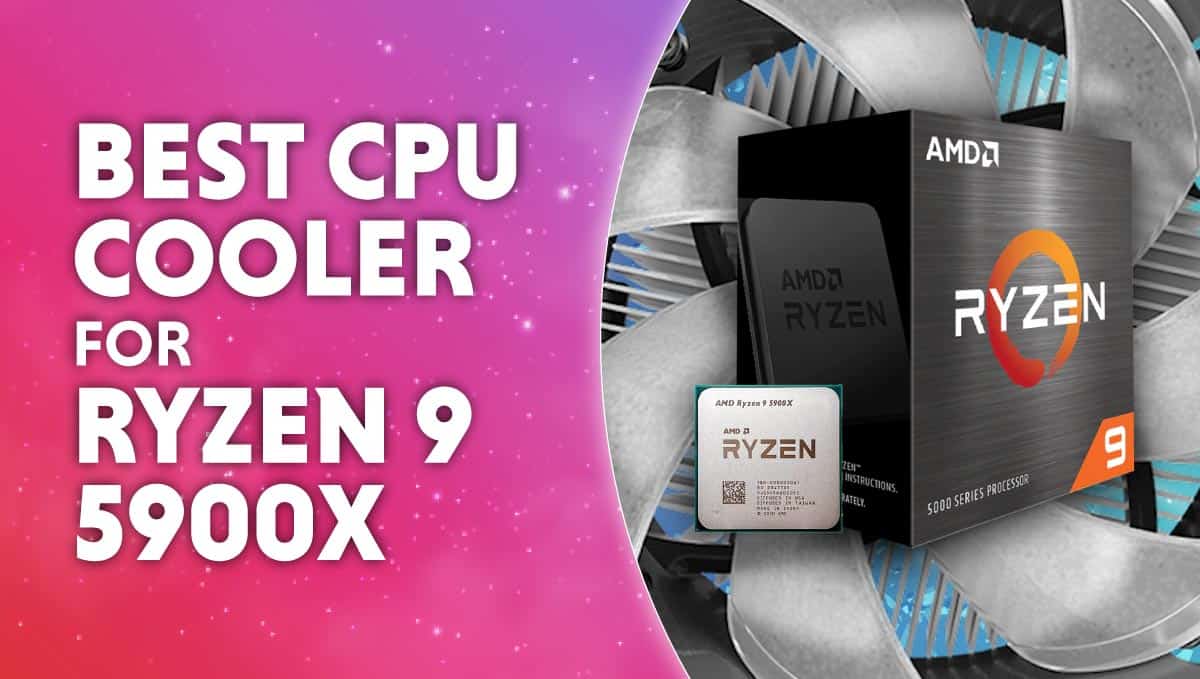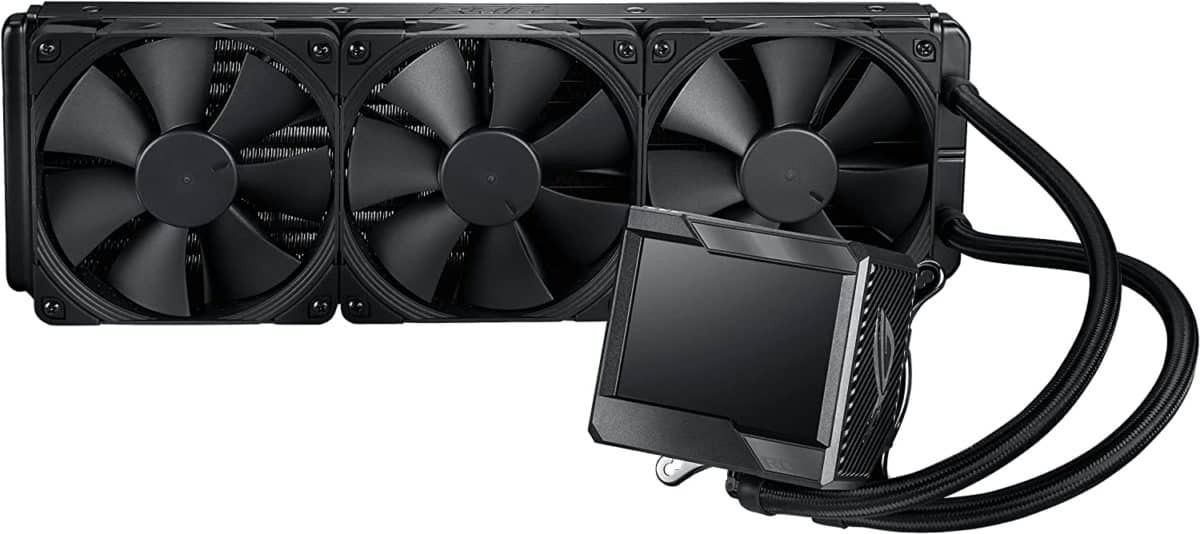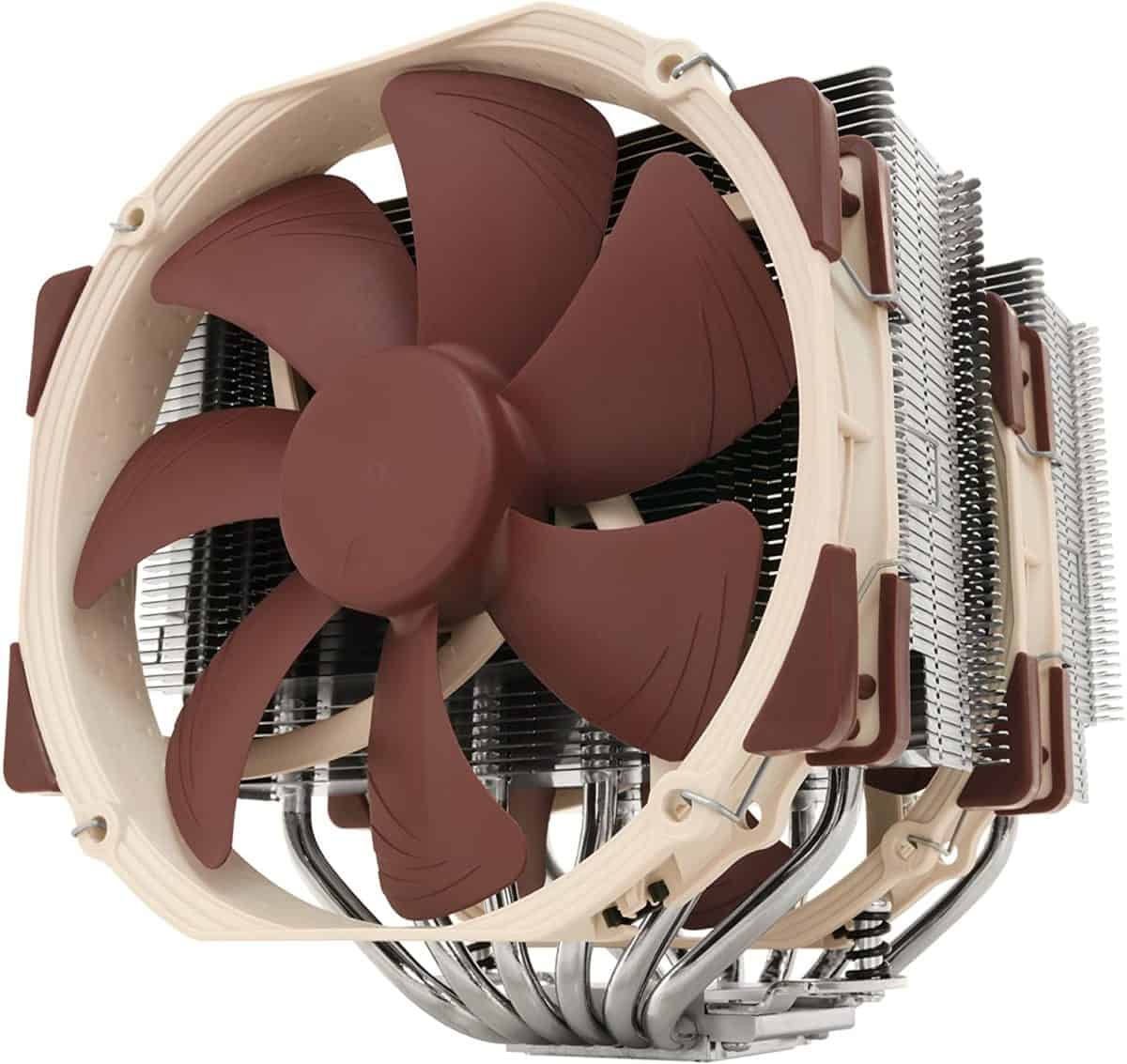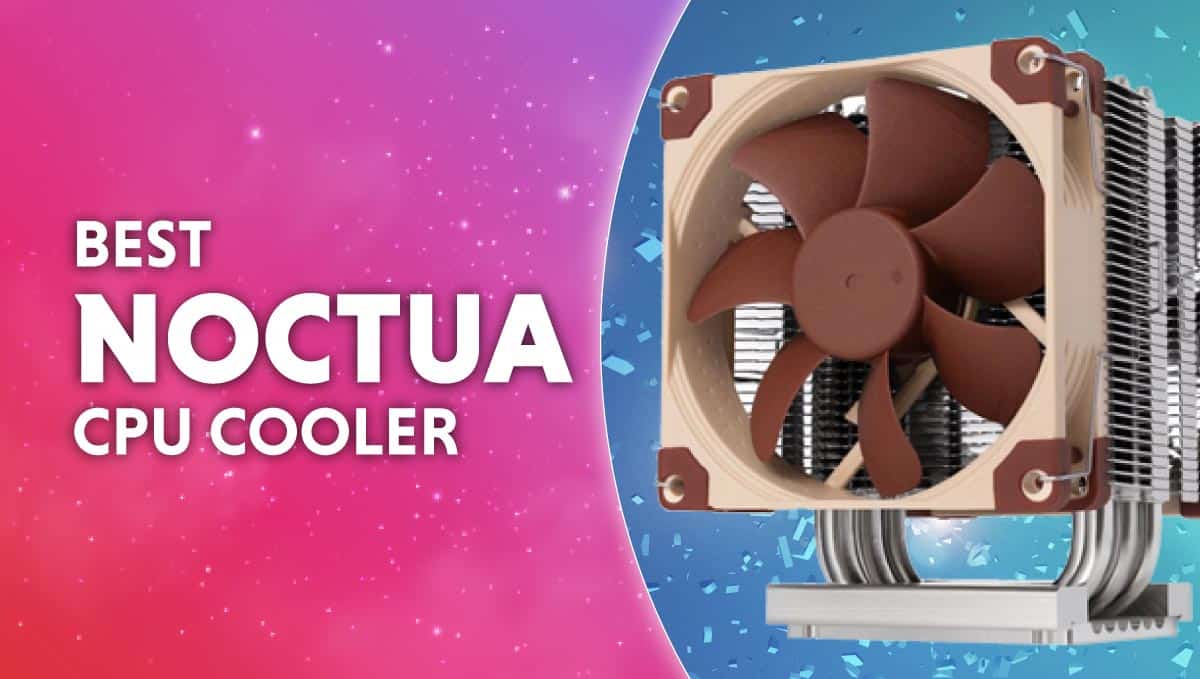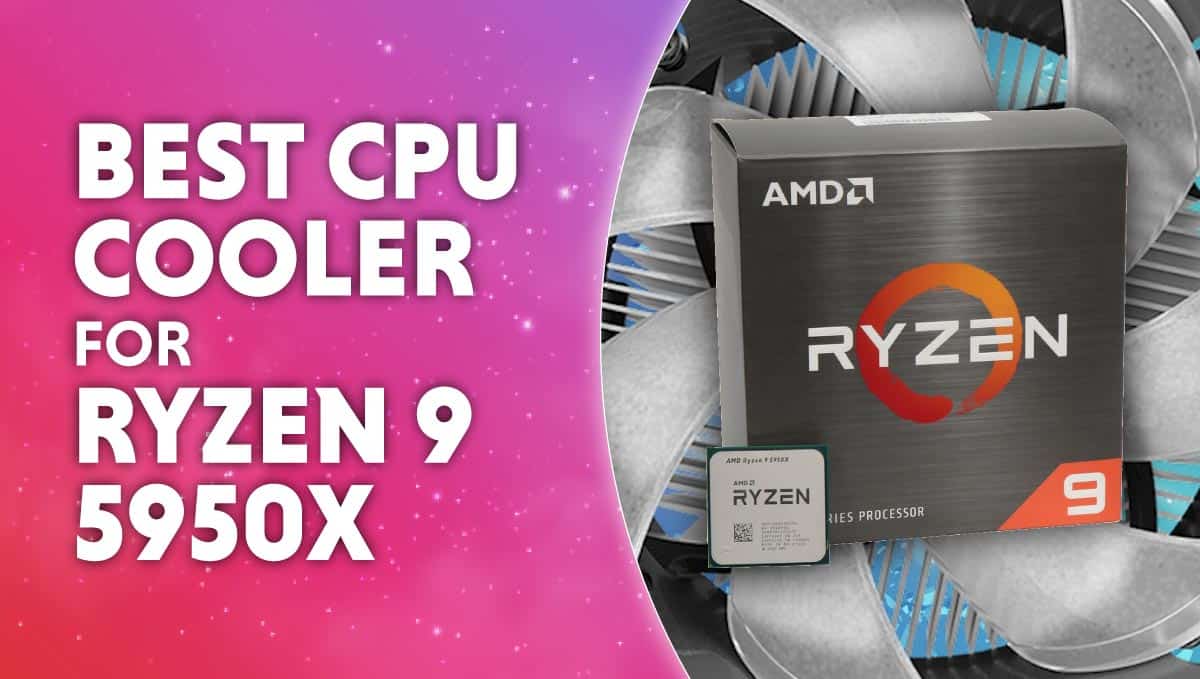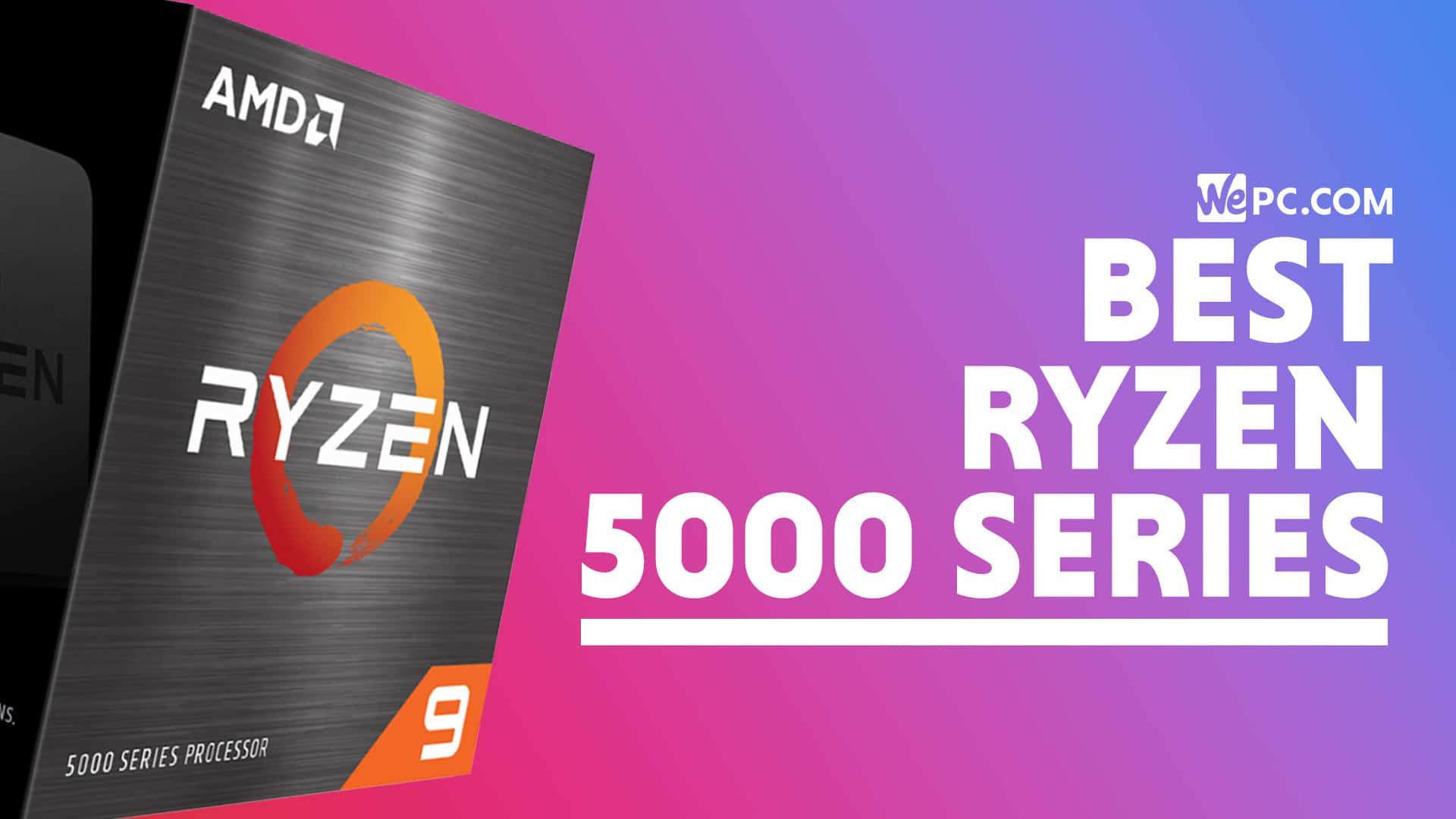How do CPU coolers work?
CPU coolers are pretty complicated in terms of actual physics, but they aim to fulfill one single purpose and that’s to dump as much heat out of the CPU as possible. CPU coolers achieve this in a few ways.
There are some basic physics to understand here if you want to know how CPU coolers work. Heat dissipation is performed via three main methods, conduction, convection, and radiation. Most CPU coolers use at least one of the three methods at some stage throughout the cooling cycle.
Let’s use an air cooler for this example to keep things simple. An air cooler consists of a cold plate, heat pipes, a heat sink, and a fan. We’ll run through each component step-by-step and explain the process chronologically.
Cold plate
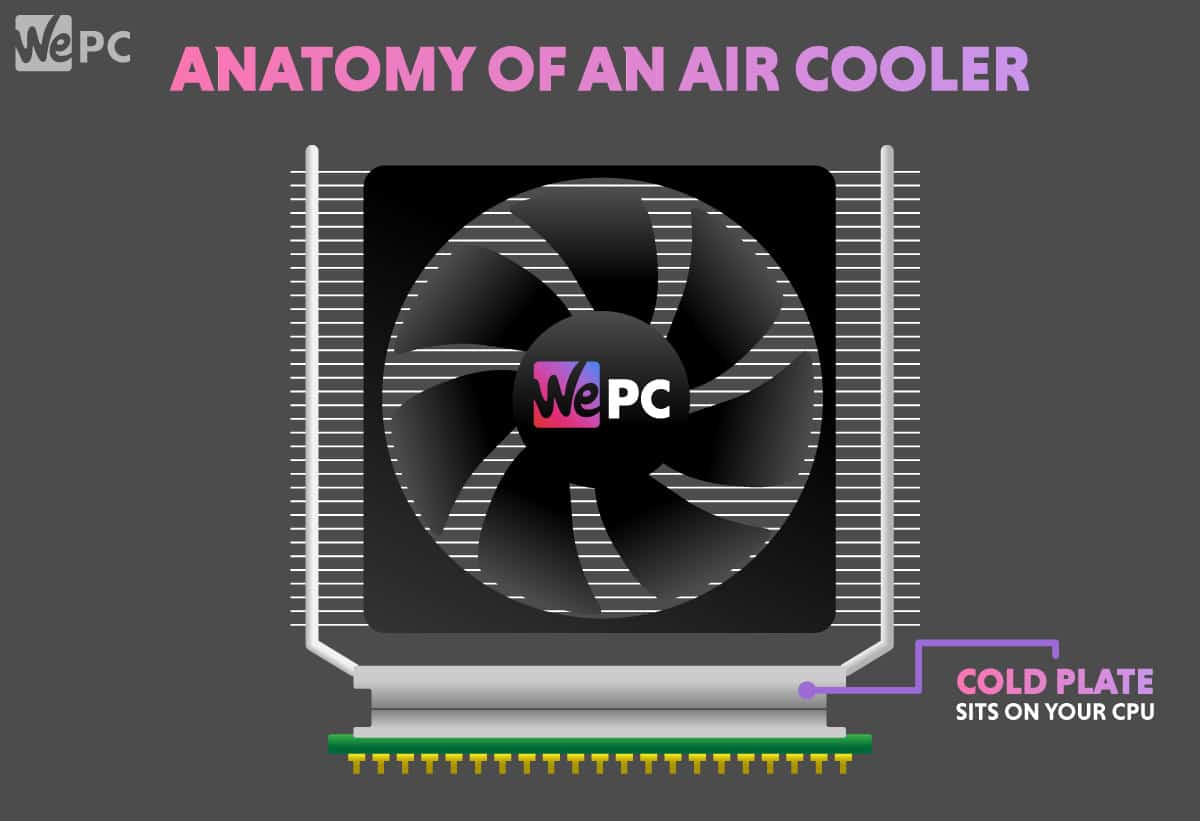
The CPU die heats up through normal use, and as a result, so does the IHS (integrated heat spreader) of the CPU. Between the cold plate and the IHS lies thermal paste, to allow better contact between the IHS and the coolers cold plate.
Thermal paste aims to eliminate any air bubbles between the IHS and cold plate as air is a fantastic insulator. Heat is then transferred from the CPU to the cold plate through conduction.
Once the cold plate heats up, the heat is passed along to the heat pipe.
Heat pipe
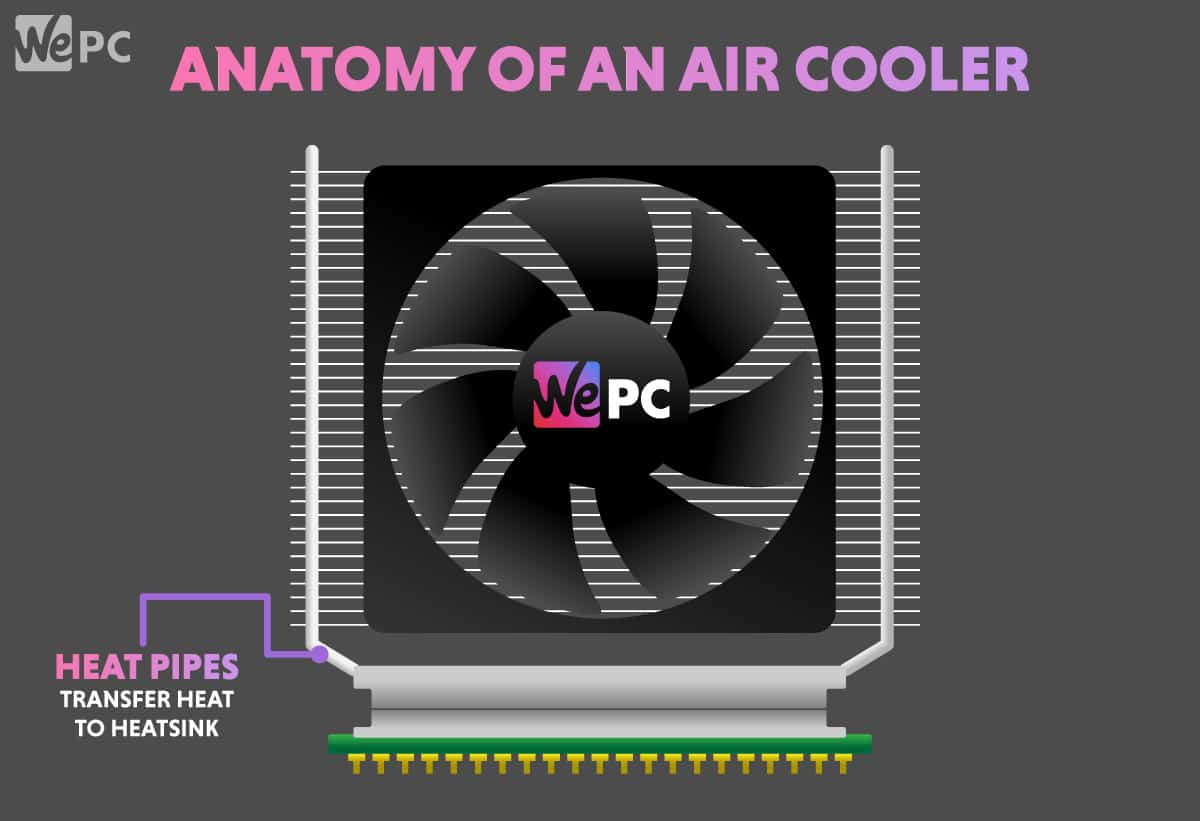
The hot plate is now hot, meaning it cannot grab heat from the IHS efficiently, so the heat has to be passed to a copper heat pipe. This heat pipe contains a wet wick to help better transfer the heat to the heat sink. Some of the heat may dissipate into the air from the heat pipe but not much due to its low surface area.
The heat pipes’ main purpose is to move heat away from the cold plate and into the heatsink for more aggressive convection.
Heatsink
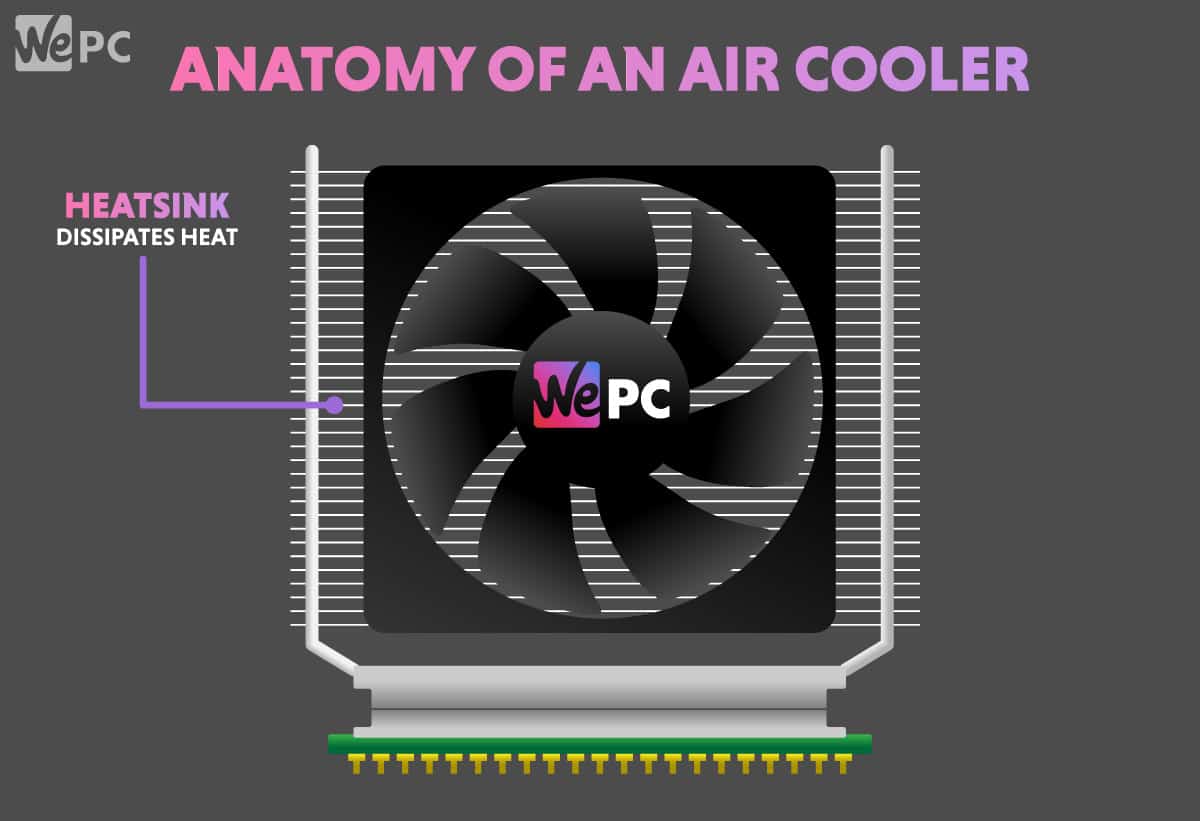
The heatsink is a large copper or aluminum (or any good conductor of heat) block with fins to increase its surface area greatly. These fins surround the heat pipes coming from the cold plate to extract heat and radiate it into the air around the heatsink.
The larger surface area helps the heatsink radiate heat more effectively as it’s touching as much of the air around it as possible. This allows more opportunity to transfer its heat into air molecules.
This is how passive cooling works, passive cooling can be enough for lower-powered chips, but certainly not a 5900X.
To turn the passive cooling into active cooling we need a fan.
Fans
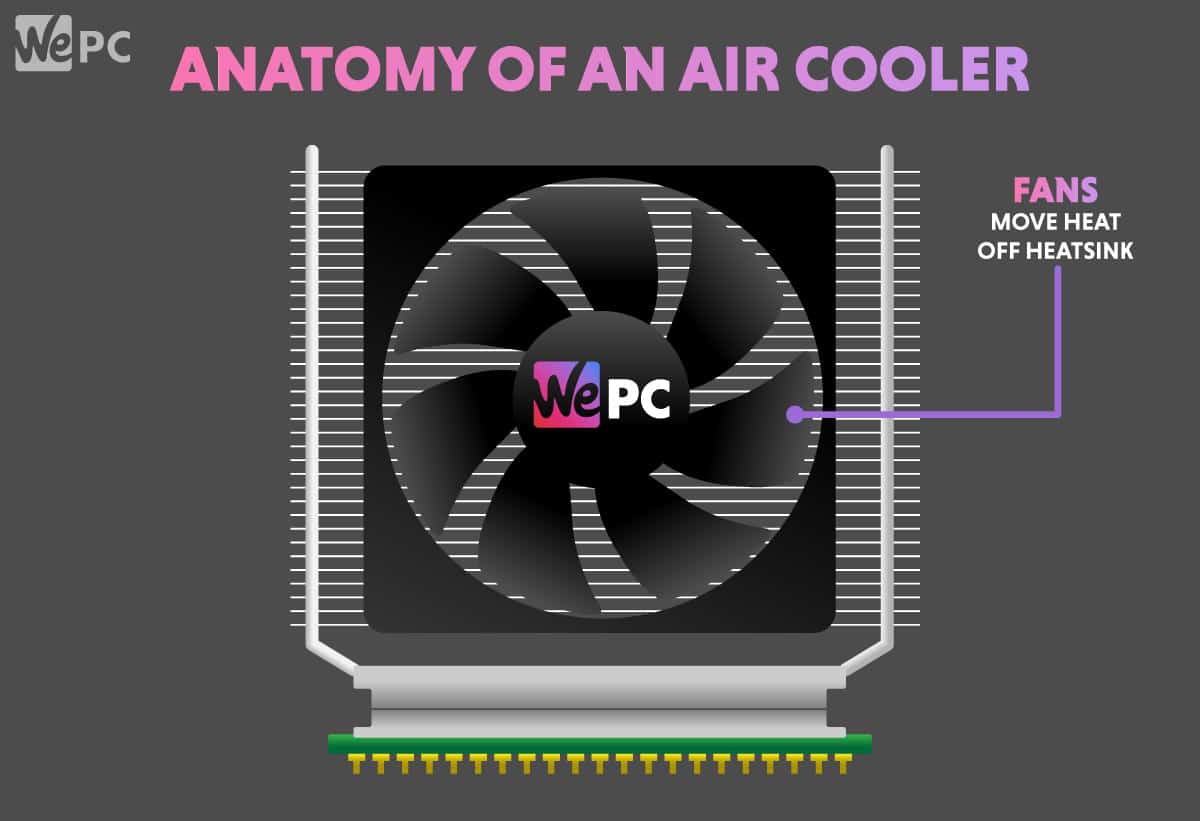
Fans are there to move air around the heatsink to allow for new, fresher, colder air to surround the heatsink to allow for easier heat transfer. The heat convection coefficient states that it’s easier to warm something up the colder it is. That’s why we want the air around the heatsink to be as cool as possible.
The inclusion of the fan also changes the dissipation method to convection rather than radiation, as we’re using the fan to smash cold air particles into the heatsink to pick up heat. As opposed to waiting for the heatsink to radiate the heat into its surroundings.
Things to consider
There are a few things to consider when opting for a brand new CPU cooler such as air vs liquid, socket, TDP, and more. We will run through everything you need to know before picking the cooler that’s right for you and your 5900X.
TDP
Earlier we mentioned TDP. TDP is the very thing we’re hoping to negate when installing a CPU cooler, TDP stands for thermal dynamic power and is the maximum amount of heat a component can output at maximum load.
A more powerful CPU will contain more cores clocked at a higher speed, for example, the addition of these faster cores increases power consumption, much like a fast car eats fuel.
When any electrical component operates, it wastes some of its energy as heat. This is a natural almost unstoppable occurrence, all we can do is integrate IHS’ onto the CPU die to allow a more efficient transfer of heat between CPU and cooler.
Make sure the TDP dissipation statistic on the CPU cooler you’re planning on getting exceeded the TDP of your CPU, especially if you plan on overclocking.
Air vs liquid cooling
The age-old question is, what’s better? Air or liquid cooling? The answer might surprise you as both options are incredibly viable, even in 2022.
Air cooling
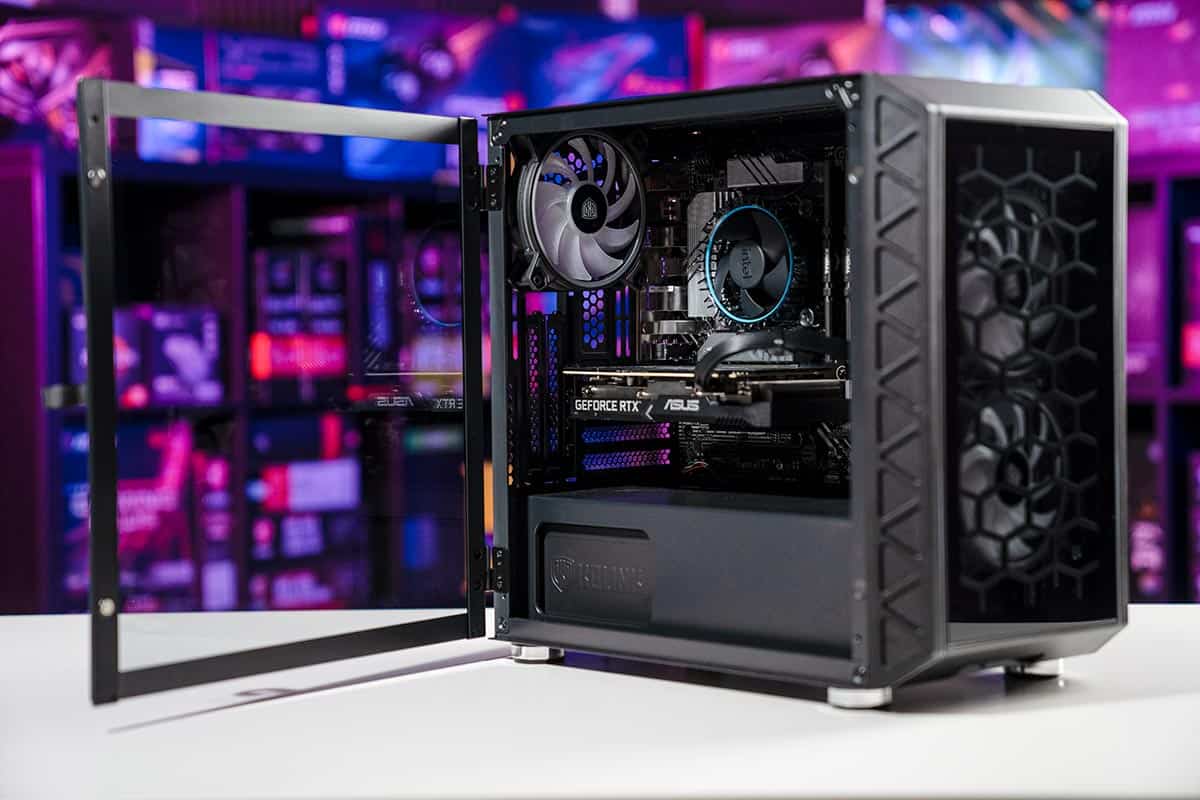
Air cooling has been around since the dawn of computers, and even the most advanced water-cooled systems still use forms of air cooling to dissipate heat away from radiators.
There’s not too much to say about air coolers as they’re pretty simple. Air cooling tends to be much less expensive than most of the liquid cooling options out there and tends to be much easier to clean and maintain. However, air cooling tends to be less efficient and can cause inefficiencies if improperly configured.
Dust build-up is a big problem air-cooled systems face, dust greatly reduces efficient heat transference due to its insulating properties. But as we mention earlier, air-cooled systems are much easier to maintain when it comes time to give your PC a good clean.
Liquid cooling
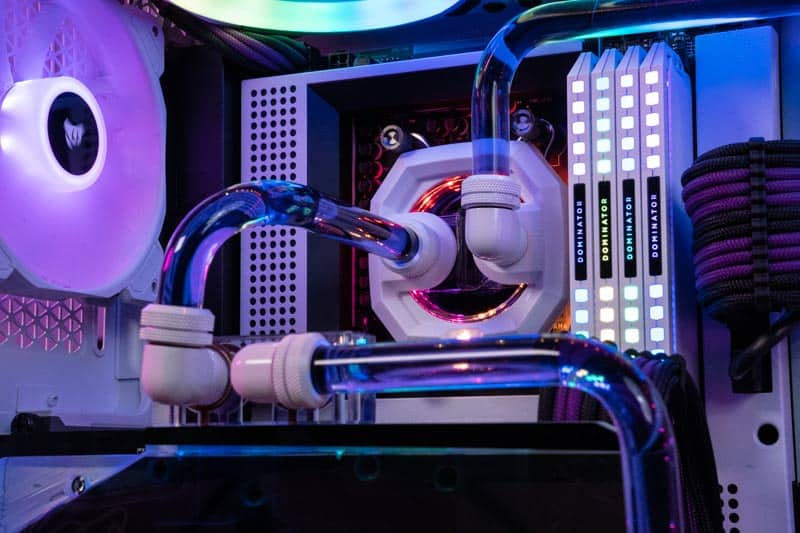
Liquid cooling systems have also been around for a long time, you can find all sorts of janky custom water loops in the archives of google images. Nowadays, we have components like AIO (all in one) CPU coolers that make water cooling a breeze. We still have the good old custom loops, but these are still a challenge to even the most skilled PC builders.
Maintenance is a little trickier in general because you will need to remove multiple fans and possibly a radiator to sufficiently clean. This is also a best-case scenario as we’ll see soon when we get into custom loops.
AIO liquid coolers
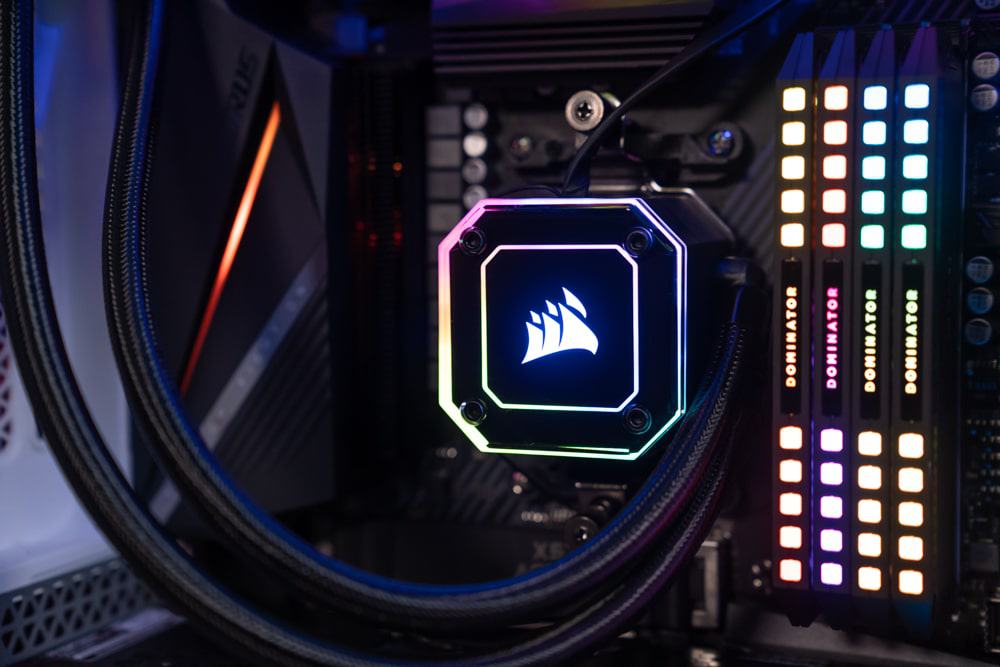
AIO liquid coolers are all the goodness of liquid cooling, and the convenience of a simple fan cooler rolled into one component. These components consist of a CPU water block, flexible tubing, and a radiator. The process of cooling is much of the same, conduction and then convection there’s just liquid involved in moving the heat from the CPU to the radiator.
AIOs tend to be a lot more expensive than air coolers (of course depending on the size and type you buy) but do perform significantly better in almost all cases.
A lot of AIO CPU coolers now have some quality of life improvements like LCD screens built into their CPU block, but this of course raises the cost of the AIO significantly.
Custom loops
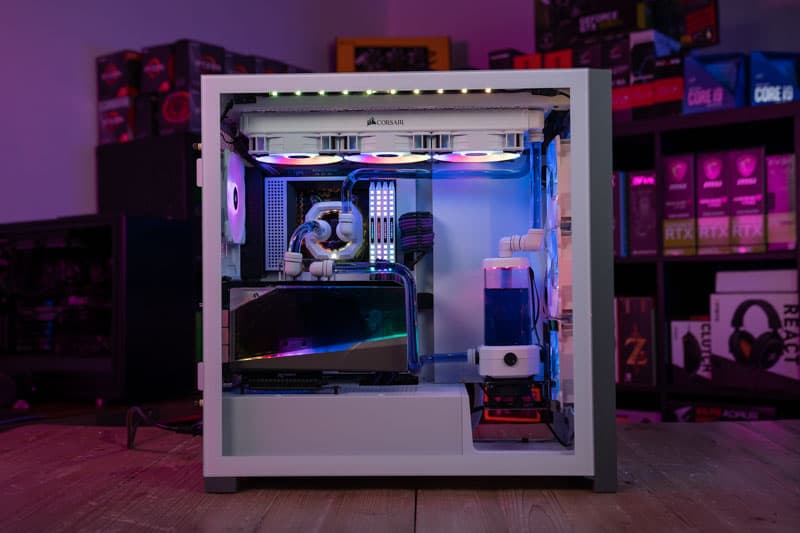
Custom loops are the most expensive way to cool your PC, costing anywhere from $150 to around $1000 for a decent half or full custom loop.
The Physics and objectives are the same as AIO coolers, to use water to draw heat from the CPU to a radiator. The trick is that custom loops do it a lot more efficiently.
Custom loops can use any size reservoir with a pump capable of moving large volumes of water rapidly. This combination of advantages means custom loops can cool a lot more efficiently than AIOs as they aren’t restricted to a specific size.
Maintenance is a lot harder on a custom loop, however. Custom loop maintenance involves draining the system of all water and then attempting cleaning or repairs. Not to mention the twice-yearly water replacement you should perform as standard.
Besides the points we mentioned, a custom loop isn’t too much different than an AIO in an operational sense.
Socket
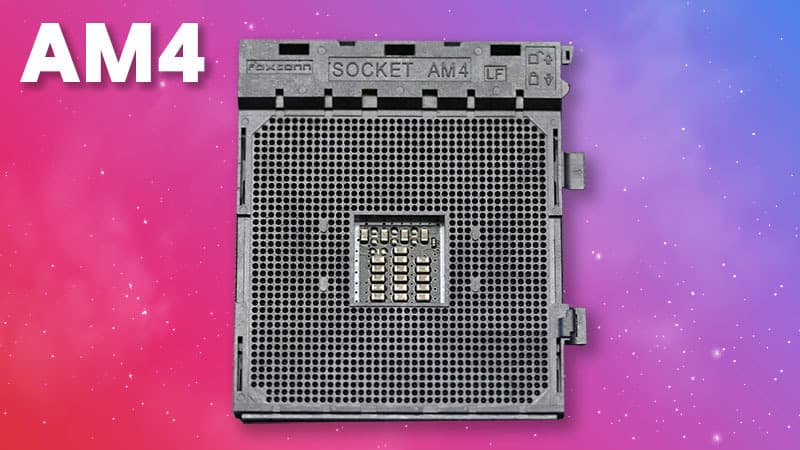
Nothing to worry about with most coolers as they’re all pretty universal, but it’s important to check that the CPU cooler you want fits the socket of the CPU you have. Our 5900X fits into the AM4 socket, that socket has been around for over five years, so you can make a safe bet that most cooler manufacturers integrate support for it into their products.
Spacial requirements
Ensure your PC case supports the CPU cooler you’re planning on getting, this may be radiator dimensions or height requirements for air coolers. Having a CPU cooler that does not fit into your case is less than ideal, and could force you to take some non-traditional measures when getting it to fit.
Best Ryzen 9 5900X cooler
Here we will list the three CPU coolers we feel are the best choice for the Ryzen 9 5900X CPU.
Asus ROG RYUJIN II 360 CPU Cooler

Asus ROG RYUJIN II 360 CPU Cooler

Model
ROG RYUJIN II 360
CPU Block Dimensions
78.15 x 87.5 x 81 mm
Socket Support
Intel: LGA 1150, 1151, 1152, 1155, 1156, 1200, 1366, 2011, 2011-3, 2066 AMD: AM4, TR4*
Fans
3x Noctua NF-F12 InductrialPPC 2000 PWM Fans
Features
3.5″ Full Color LCD Screen
The ASUS ROG Ryujin II is one of the most aesthetically pleasing AIO coolers on the market, mostly thanks to its huge pump and vivid LCD screen.
This model is available in both 240 and 360mm variants, giving builders with different size cases some flexibility regarding the size.
The Ryuijin features 380mm sleeved tubing comprised of thick rubber, to add durability and improve the visuals over duller tube designs.
The main talking point of the Ryujin II is the addition of the LCD screen, which allows any image or GIF to be displayed. The LCD screen has full AIDA64 support, meaning you can feature current system information on the 3.5″ full-color screen if hard core monitoring is your thing.
All in all, we have a beefy, efficient radiator that will provide your 5900X with all the cooling it needs, and the inclusion of a strong water pump means your CPU will never be in short supply of water to cool it.
You can check out our full Ryujin ii review here.
- LCD Screen
- High Performance
- Aesthetically, one of the best looking AIOs on the market
- Expensive
- More affordable options that perform similarly
Corsair iCUE H150i Elite Capellix Liquid CPU Cooler
Corsair iCUE H150i Elite Capellix Liquid CPU Cooler

Item Dimensions LxWxH
15.63 x 4.71 x 4.71 inches
Brand
Corsair
Cooling Method
Water
Noise Level
36 dB
When the Corsair H150i iCUE Elite Capellix first arrived on the scene, it was high on a lot of PC builders’ lists. Corsair managed to keep its unmatched efficiency and magnificently update the aesthetics.
The cooling potential of the H150i matches the competition and there are other similar variants to cater to a variety of case sizes too. This 360mm option is perfect for the new high-end Ryzen CPUs, including the 5900X, and the RGB makes almost any system look like it means business.
Speaking of aesthetics, few coolers do it as well as the Capellix. From the pump to the fans, it is incredibly well designed, and it can provide all the cooling a high TDP CPU needs.
- Quiet Running Volume – This system should rarely break 36dBA.
- RGBs – bright and punchy, these RGBs will breathe new life into your case.
- Pump Design – A split-flow copper cold plate and a ton of micro-skived fins enable you to push your CPU to the limit.
- Price – You may have to liquidate your assets to afford this liquid asset.
- Installation – The fans can be difficult to screw into place.
Noctua NH-D15
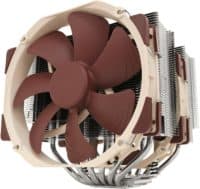
Type
Air
Max RPM
1500 RPM
Max Noise
24.6 dB
Dimensions
(H)165 x (W)150 x (D)150 mm
The Noctua NH-D15 stands tough against its competition, this air cooler even gives liquid coolers a run for their money.
The design is certainly to a specific taste but we are a fan of the brown, and it’s the cooling potential that matters most when opting for a CPU cooler.
The size can be an issue if you’re wanting to build in a smaller form factor, with extra clearance needed for the two giant heatsinks and accompanying 140mm fans. Noctua does offer an ‘S’ variant, which is significantly downscaled for those that lack the space for the larger model.
Overall, if you can fit this into your PC, it’s one of the best air-based coolers on the market to date. The max noise sits near 24.6dB and with a max RPM of 1500, offering high performance with low noise levels.
- Solid thermal performance
- Excellent acoustic performance
- User-friendly mounting system
- Outstanding build quality
- Comes with (2) 140mm fans
- Relatively expensive
- Hefty size
Final word
Choosing a new CPU cooler is an important task, especially when you’re cooling something as powerful as the Ryzen 9 5900X. The Ryujin ii definitely takes the cake here, with its superior design and cooling ability.
You wouldn’t be disappointed if you opted for either the Capellix or the Noctua however, as both coolers are incredibly viable options. This was the best CPU cooler for AMD Ryzen 9 5900X.

